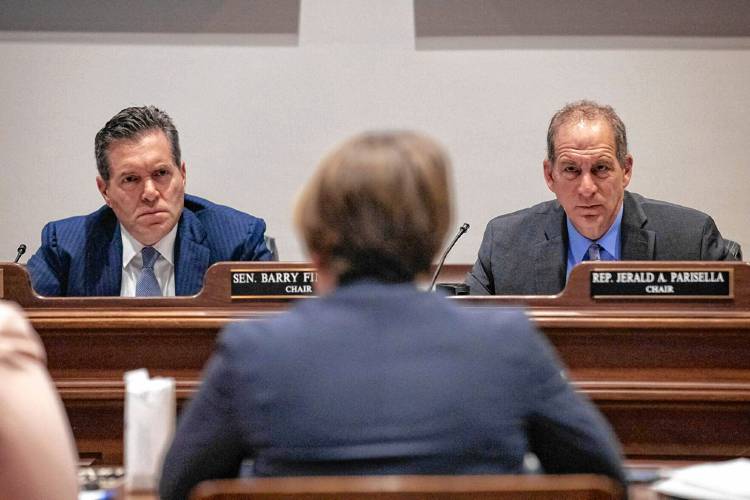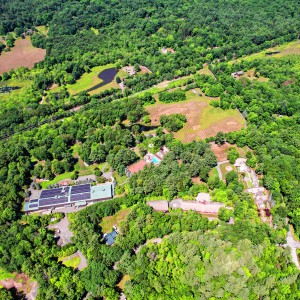Senate to bring forward $2.8B economic development bill

Sen. Barry Finegold and Rep. Jerald Parisella, co-chairs of the Joint Committee on Economic Development, listen to testimony from Gov. Maura Healey on May 7. STATE HOUSE NEWS SERVICE
| Published: 07-09-2024 3:28 PM |
The Senate will dig into a massive economic development package Thursday after top Democrats on Monday morning released their own vision for how Massachusetts should pursue job and economic growth opportunities.
The Senate’s bill (S 2856) authorizes $2.444 billion in borrowing, giving the executive branch flexibility to put as much of that amount into use as it determines is necessary and wise, and $350 million in tax credits mostly to be deployed in the climate technology sector.
It also includes a number of policy provisions, including clearing the way for a professional soccer stadium to be built on a blighted land parcel in Everett. The House and Senate have both supported the idea over the past few years, but have not been able to get on the same page at the same time.
In late June, the House voted 155-2 to pass its own economic development bill (H 4789) that largely mirrors the version Gov. Maura Healey proposed. That bill features $3.4 billion in long-term bond authorizations and an additional $700 million in tax credits, including investments to reauthorize the life sciences initiative for another decade and make a parallel investment in “climate tech.”
Asked why the Senate chose to authorize less borrowing, specifically for the life sciences industry, the bill’s lead architect said senators were comfortable with the smaller authorization.
“We are very bullish on life science and we continue to be very supportive,” said Economic Development Committee Co-Chair Sen. Barry Finegold. “We think that by putting the numbers that we put forward, it will make a huge impact. Obviously, we have a version, the House has a version and the governor has a version. I think we’ll find a number that everyone can agree on. We’re very comfortable with the number we put forward.”
The House proposed $500 million for the Massachusetts Life Sciences Center to provide grants and loans to grow businesses in Massachusetts, while Senate Democrats suggested only $225 million to support the reauthorization of the Life Sciences Initiative.
Though the Senate’s proposal authorizes less borrowing, it also provides the life sciences center more flexibility by adding health equity, biosecurity, digital health and artificial intelligence to its mission. The bill further expands program eligibility to the so-called alternative protein industry, and redefines “life sciences” to include preventative medicine, biosecurity, life sciences artificial intelligence and medical technology, according to Finegold’s office.
Article continues after...
Yesterday's Most Read Articles
Bond authorizations in the Senate bill include $400 million for MassWorks public infrastructure grants, $150 million for municipal library projects, $100 million for an Applied AI hub, $100 million for the Rural Development Program, $100 million for the Seaport Economic Council grant program and $99 million for advanced manufacturing initiatives — all mirroring the House bill.
Senators would steer more toward the Massachusetts Tech Hub than representatives, $115 million compared to $75 million in the House bill, but also reduced the House’s proposed $10 million authorization for grants to support alternative protein companies to $5 million, according to a summary from Senate President Karen Spilka’s office.
Finegold emphasized the climate tech investments in the Senate’s version of the bill, which are similar to what the House passed last month with $400 million in bond authorizations and $300 million in tax credits.
Both drafts break that $400 million into two $200 million investments — one for a Clean Energy Investment fund to support the development of climate tech businesses, and another supports the nascent wind industry in Massachusetts with workforce development, deployment and research, and development.
The tax credits are meant to incentivize the growing climate technology field. Beacon Hill leaders want to be on the forefront of that industry, viewing it as a way to both reduce greenhouse gas emissions and capture a profitable new sector for Massachusetts.
“We are No. 1 in the country for per capita climate startups, and I think what we’re really trying to make sure of is that we keep these companies here,” Finegold said. “We have to also realize that we’re competing with California and New York, and we can’t be complacent, so we really made climate tech a big priority.”
The climate tech tax credit mirrors one that already exists for life science companies, for businesses exploring clean energy, decarbonization, emissions mitigation or other climate-related innovation. It allows up to $30 million per year over five years.
The Senate Ways and Means bill also includes a $50 million internship tax credit over five years, for employers hiring net-new paid interns who are enrolled in or are recent graduates of Massachusetts’ higher education institutions.
It repeals the so-called “angel investor” tax credit, which was offered to investors interested in funding early-stage companies engaged in life sciences research and development, commercialization and manufacturing.
“It just, once again, was something that I think we are making some tough decisions and something that, there are some things where we unfortunately have an unlimited amount of demand and finite resources,” Finegold said about repealing the credit.
Senators also left a live theater tax credit on the cutting room floor, which both the House and Healey included in their bills.
Healey recommended a five-year pilot program offering $5 million per year that would support “pre-Broadway, pre-off Broadway, and national tour launches” in Massachusetts. That total was increased in the House via a Rep. David Biele amendment to a $7 million annual cap on the credit, with Biele arguing that Massachusetts used to be a destination for shows, before other states lured them away with incentive programs.
“There’s certain priorities the House has, and at the end of the day we’ll come together and see where it goes,” Finegold said, when asked about the exclusion of this credit in the Senate Ways and Means bill.
Another policy section of the bill would authorize foreign-licensed physicians to apply for a limited license to practice medicine in the state, with a pathway to a full unrestricted license. Oftentimes immigrants who were doctors or nurses in their home countries cannot get similar jobs in the United States without first completing more education and certifications, even if they had already been practicing for years.
The bill would also create a special working group on youth sports to investigate the health impacts and financial challenges around children’s sports, and make regulatory recommendations.
Lawmakers held a hearing last fall on how the youth sports landscape has changed dramatically with the rise of private club teams — and with it more early specialization, overtraining, injuries and burnout — and batted around potential ways for the state to implement some kind of oversight structure for kids’ athletic programs.
“It’s something I hear a lot about from parents,” Finegold said. “We see minor injuries in kids up dramatically, especially ACL injuries. So we’re really looking at this. It’s something that I think is very serious, not only financially for parents, but I think about the long-term damage we’re doing to our kids, because so many of these kids are now specializing in sports. And not only is it not good for them, but it is getting incredibly harmful for them.”






 ‘It’s a Wonderful Night in Turners Falls’ showcases village businesses, nonprofits
‘It’s a Wonderful Night in Turners Falls’ showcases village businesses, nonprofits Sackrey Construction Co. of Sunderland celebrating 35 years in business
Sackrey Construction Co. of Sunderland celebrating 35 years in business Photo: As darkness falls
Photo: As darkness falls Leverett residents rap Kittredge compound plans, urge caution as negotiations for 400 homes move forward
Leverett residents rap Kittredge compound plans, urge caution as negotiations for 400 homes move forward 
